p.1410
p.1418
p.1423
p.1427
p.1431
p.1438
p.1443
p.1453
p.1459
The Analysis of Behavioral Responses to Transit Information
Abstract:
Road conditions, time for travelling and transfer information can be provided by transit information service system for the person travelling during the trip. The system can help people to select more reasonable routes, which can improve the travelling efficiency and attract more and more people using public transport. Based on the survey of transit information service in Beijing, this article will analysis the demand types of transit information. The effects of transit information-travel mode selection can be researched by ordered logit model. The results indicated that the passengers prefer static information at present. The information contains various elements for people travelling such as gender, main travel mode, average waiting time and the accuracy of transit information, demand types and releasing devices. These factors will impact passengers on selecting and changing their mode choice.
Info:
Periodical:
Pages:
1431-1437
Citation:
Online since:
December 2012
Authors:
Price:
Сopyright:
© 2013 Trans Tech Publications Ltd. All Rights Reserved
Share:
Citation:


